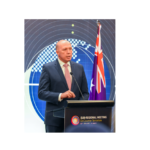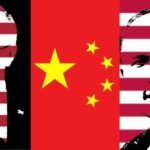“The Threat From China Is a Lie”: Peace Activist Nick Deane on the Build Up to War
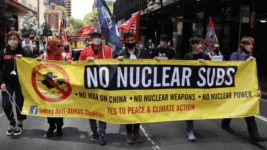
Talk of war with China has been mounting over recent years. The current Labor government, and the Coalition before it, have been warning that Beijing has become increasingly aggressive, which is leading to growing tensions in the Indo Pacific that must be countered.
This is not the first time the Australian public has been primed for a potential conflict. At this time twenty years ago, there was rising talk about the threat that Iraq posed due to the weapons of mass destruction it supposedly possessed. And this led to the invasion in March 2003.
Now opposition leader Peter Dutton took a prominent hawkish stance on China in the last years of the Morrison administration. And while the Albanese government has taken a more tactful approach with foreign minister Penny Wong in the lead, war with China continues to be on the agenda.
Indeed, as with most other wars the nation has been embroiled in since World War Two, Australia hasn’t been directly threatened by China, rather it’s blindly following Washington’s lead on the matter, in a conflict that will serve the interests of our US ally.
Unimpeded access
AUKUS is part of the build up to war with China. Unveiled by then PM Scott Morrison in September 2021, the pact is an agreement between Australia, the UK and the US, and while its details are sketchy, it’s clear its focus is on “security challenges in the Indo Pacific region”, which means China.
Central to the AUKUS agreement is that our nation will be provided access to US technology that will see it acquire eight nuclear-powered submarines, which will ensure Australia can approach close enough to China that it can strike the mainland with missiles.
Another military pact involving the US and Australia is the 2014 Force Posture Agreement, which provides that an increasing number of US troops rotate through the north of the country on an annual basis, and that Washington has unimpeded access to dozens of Australian military facilities.
Meanwhile, the 1951 ANZUS treaty continues to be the foundational security agreement between this country and the United States.
However, the commonly held belief that ANZUS ensures that the US would be required to back an Australia under attack is a falsehood, as the United States only ever acts in its own interests, whether that be in relation to Beijing or Canberra.
War or peace?
Long-term Sydney peace activist Nick Deane is taking the opportunity afforded by the passing of two decades since the beginning of the war in Iraq to shine a light on the similarities between the current prepping of the public for a conflict against China and that in the build up to Baghdad.
A member of the Independent and Peaceful Australia Network (IPAN), Deane is hosting a forum on the day that Iraq was invaded in Marrickville next month, which will see speakers like Senator David Shoebridge, Dr Alison Broinowski and Mary Kostakidis consider the rising rhetoric on war with China.
Sydney Criminal Lawyers spoke to Marrickville Peace Group convenor Nick Deane about the similarities between the march to war now and that of 20 years ago, the impact of the Force Posture Agreement and the way forward according to peace activists like him.
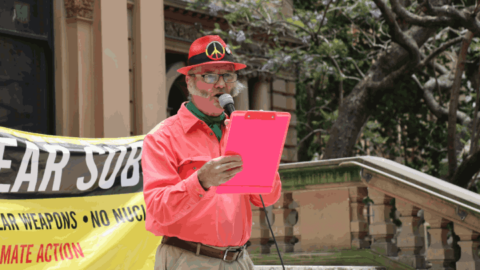
Nick, you’re currently organising the Can War Be Avoided or Will Peace Be Shattered meeting at Marrickville Town Hall, which will deliberate upon Australia’s military stance.
The forum’s timing is significant as it coincides with the 20th anniversary of the beginning of the invasion of Iraq. So, why is it important that the inception and impact of this conflict be reflected upon in relation to the present?
You’ve given me the long title, Can War Be Avoided or Will Peace Be Shattered, but when it’s on the poster, the words will be War or Peace with a question mark.
That’s because, at the moment, we’re standing on the cusp and decisions being made in the next months are going to decide whether we have a warmongering or a peaceful future.
My greatest fear is that we will be dragged into war again.
What we seem to be doing is repeating a pattern we’ve done many times before. You can go back to Korea but, certainly, there’s Vietnam, Afghanistan, Iraq and even Syria.
We’ve gotten involved in all these wars mostly through America’s influence. In particular, in the case of Iraq, we got involved based on lies about weapons of mass destruction.
So, we need to ask ourselves whether we’re being told lies now that will drag us into yet another war, this time with China.
My answer to that question is there is a fabrication being spun, which considers China some sort of threat to Australia, while there’s not a shred of evidence that it poses any sort of a military threat to us.
It’s worth recalling the lies that were told to us in 2003, which dragged us into war, and ask the question, are we going through the same process again? Is this pattern being repeated? Are we being told lies now?
The threat from China is a lie, and the other complete falsehood is the idea that nuclear submarines will somehow guarantee peace.
In my view, and the view of others like me, it’s exactly the opposite: getting nuclear submarines is going to increase tensions in the world and make peace less likely.
These are the basic connections. And that’s why it’s so important that we recall what happened on 20 March 2003, when the invasion of Iraq started and use that as the starting point to talk about what is happening today.
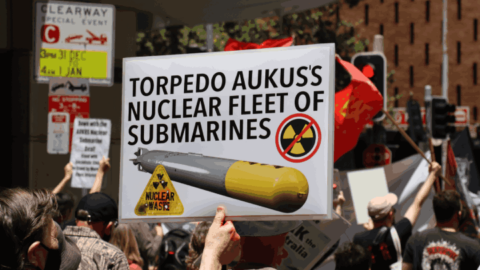
Under the Morrison government, Australia became a key player in the build up to war with China, while trade relations with Beijing soured.
With foreign affairs minister Penny Wong taking the lead, the Albanese government has thawed relations with China, although it’s also deepened our defence relationship with Washington.
How is our nation’s relationship with China at present?
It is absolutely precarious, notwithstanding Wong’s more subtle and genuinely diplomatic approach.
The Chinese are not stupid. They are anything but. They can see what’s going on in Australia, and they’ve got valid reasons for not liking it.
The danger is that China will punish Australia as an example to other nations in the Quad: India, Japan and the USA.
The danger is they’ll take it on Australia just to show those other nations what they’re capable of. That’s if we carry on down the path we’re on.
John Lander suggests that Australia is in the process of being manipulated by the USA into military confrontation with China. What he’s saying is we could become involved in a proxy war for the USA with China.
I don’t quite subscribe to that, but I can see the danger, as our whole relationship with China is precarious, and it wouldn’t take much for us to upset it badly.
A key feature of the build up to war with China is the establishment of the AUKUS pact. This involves Australia acquiring eight US developed nuclear-powered submarines that would enhance our ability to strike mainland China.
Many were shocked that the public weren’t consulted on AUKUS, especially due to its nuclear implications. You’ve been a peace activist since the 1960s, so how do you consider the addition of AUKUS and the way it was rolled out?
When I first heard the announcement, my initial thought was, They wouldn’t, would they? But very quickly, I adjusted that to, Yeah, they would, wouldn’t they?
I was unsurprised by the lack of any public consultation or discussion. It seems that every significant step in terms of military or defence that’s been taken in the past has been without consultation and without parliamentary debate. They’ve been taken in secrecy.
In 2003, we went to war in Iraq, with no debate beforehand, and despite the public making very clear that it was contrary to national interests.
In 2011, Julia Gillard allowed US marines to be stationed in Darwin, again, without any public consultation. It’s just presented as fait accompli. Only the defence establishment had any foreknowledge of what was going on.
The same pattern is characterised in the AUKUS pact. It’s presented as if there is nothing remarkable about it, like it’s routine stuff. But it’s not.
It changes the whole flavour of our defence stance. It is extraordinarily significant, but it’s trotted out with the general public being left with no influence on what has taken place.
Nevertheless, the little things that are considered trivial in comparison to defence get discussed in parliament. But not matters about national security. They’re taken without public consultation. It’s an established routine now.
With the rotation of the extra US troops in the north, and the recent news that a US-led overhaul of RAAF Base Tindall has included storage for six nuclear-capable B52 fighters, awareness around the 2014 Force Posture Agreement has grown.
The FPA provides the US unimpeded access to certain Australian military bases, along with the regular rotation of US troops through the north and the enhancing of interoperability of the two nations’ air forces.
In your opinion, what has the impact of this nine-year-old agreement been on the ground?
Australia has relinquished too much control to Washington under the terms of the FPA.
At the time, the FPA was a logical follow on from the establishment of the US marine presence in Darwin. And again, it was another thing that was established with no public discussion.
It grants sweeping access to Australia. It provides the US with extraordinary freedom to use our territory and facilities. And most Australians are completely unaware of what the FPA gives to the USA.
It’s hard to comprehend that any nation could so easily give away control over what happens militarily on its soil.
And though the FPA has words like “with the agreement of Australians”, it seems America could conduct military actions from Australia on its own behalf.
That’s appalling, that our country could be used in that manner, but that’s what the FPA grants to America. It’s a real danger.
The US recently announced that it’s further beefing up its involvement in the war in Ukraine, while the US Bulletin of Atomic Scientists has set the Doomsday Clock the closest it’s been to midnight, due to the heightened threat of nuclear war this conflict involves.
While the implications of the Russian invasion of Ukraine are further removed for Australia than is the build up with Beijing, what are the broader implications of this European conflict in terms of the Indo Pacific?
Australia became loosely connected with NATO during the occupation of Afghanistan. We still keep close relations with European nations. And we are yet to come to terms with our geographical location.
So, that explains, to some extent, our involvement in the war in Ukraine.
But there is a danger that the Quad – India, Japan, Australia and the USA – will become a de facto NATO in the Indo Pacific region. The common denominator for both NATO and the Quad is the USA.
But there is one significant difference between what happened in Ukraine and what might happen in Taiwan, and that is that Taiwan is essentially an internal Chinese matter.
Paul Keating reminded us that Taiwan is not a vital Australian interest. But having said that, there is no doubt in my mind that unless the peace movement can raise enough popular support, Australia would be dragged into war as soon as hostilities break out between the USA and China over Taiwan.
It could be a matter of joining the USA as a Quad member, or we could find ourselves fighting a proxy war, as John Lander suggested, just as the Ukrainians are.
Either scenario is unacceptable. And this also gives an indication of Australia’s willingness to engage in warlike operations.
If there is a fight going on, we are like Bill Barnacle from The Magic Pudding: if there is a fight anywhere, we will join it on principle.
And lastly, Nick, the Independent and Peaceful Australia Network (IPAN) held a conference in November, which coincided with the release of a report into the viability of the US-Australia alliance and our nation’s involvement in US-led wars.
So, from the perspective of the pro-peace independent experts who put together the inquiry, what is the desired way forward for this nation in terms of its foreign policy?
It is in the organisation’s name “independent and peaceful”. IPAN would like this nation to be truly independent. It would like to escape from the myth that the character of the nation was created in Gallipoli.
We would like the nation to become a leader in the pursuit of peace instead. IPAN’s report recommends a review and renegotiation of the ANZUS treaty, in line with what’s appropriate for Australia’s needs.
IPAN calls for the elimination of all overseas presence from military bases here. It insists that the decision to go to war is made in federal parliament and not by the PM and a few cabinet members.
It urges diplomatic before military resolutions of conflict and greater investment in improving relations with neighbouring countries.
It calls on the ALP to abandon bipartisanship on defence. And it recommends that Australia sign the Treaty on the Prohibition of Nuclear Weapons.
What IPAN wants is independent foreign and defence policies, with the public being consulted on national security.
Some of my colleagues in IPAN favour arms neutrality for Australia: an idea that was put forward by David Martin in 1984.
Whether that is the best strategy is still being debated, but the consensus is that a new defence policy is needed, and this would involve a change in our understanding of what defence and security mean.
I would suggest that this should start with a clear understanding of Australia’s geography and by asking, seriously, what nation is a realistic threat to us.
My own view is that, if you take that as your starting point, you’ll quickly come to realise that Australia is extremely safe and unlikely to suffer serious attack, that is to say an invasion, ever again.
Remember Malcom Fraser’s paradox: the reason we need the USA to protect us is because the presence of the USA’s military assets might make us liable to attack.
So, in other words, if these assets were removed from Australia, then no nation on Earth has any reason to attack Australia.
An aspect we haven’t touched on is the greatest threat to national security. When you start talking about national security and what threatens it, it’s not coming not from any military enemy but the climate crisis.
War diverts resources away from where they’re needed and contributes enormous CO2 emissions. And, over and above that, it destroys any possibility for the international cooperation that is so urgently needed in the face of the climate crisis.
The war in Ukraine is a case in point. There is no possibility for any sort of negotiations between Russia and the USA.
The way things are changing, going to war and making preparations for going to war, such as acquiring nuclear submarines, are becoming increasingly stupid. They aren’t looking at where the real threat lies.


